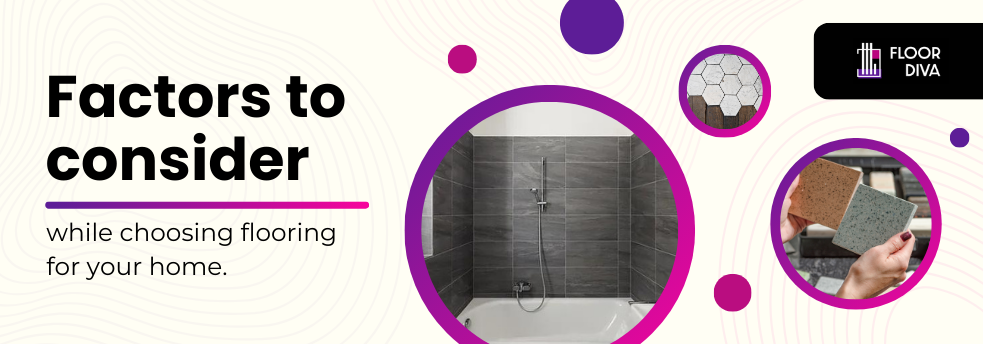Choosing the right flooring for your home is a crucial decision that can significantly impact the overall aesthetics, comfort, and functionality of your living space. With a wide array of flooring materials and styles available in the market, making the right choice can be a challenging task. In this comprehensive guide, we will explore the essential factors to consider when selecting the perfect flooring for your home.
Lifestyle and Usage
The first and foremost factor to consider when choosing flooring for your home is your lifestyle and how each room will be used. Different areas of your home will have distinct requirements. For example, high-traffic areas like the living room and kitchen need durable and easy-to-clean flooring, while the bedroom may benefit from a more comfortable and cozy option. Here are some lifestyle considerations to keep in mind:
Family and Pets: If you have children and pets, you’ll need flooring that can withstand spills, stains, and scratches. Consider options like laminate, luxury vinyl, or durable carpet.
Allergies: For allergy sufferers, hard flooring options like tile, hardwood, or laminate are preferable, as they are easier to clean and do not trap allergens.
Lifestyle and Aesthetics: Your personal style and design preferences play a significant role in your flooring choice. Consider the overall aesthetics and design of your home, ensuring the flooring complements your interior decor.
Budget
Your budget is a crucial factor when selecting flooring. Different materials come with varying price points, and you must find a balance between your budget and your flooring preferences. Flooring materials can range from affordable to premium, so it’s important to have a clear budget in mind. Here are some flooring options to consider based on your budget:
Low Budget: If you have a limited budget, options like laminate, vinyl, and certain types of carpet can provide cost-effective solutions without compromising on quality.
Mid-Range Budget: Hardwood, engineered wood, and ceramic tiles are excellent mid-range options that offer a balance between cost and quality.
High Budget: If you have a generous budget, you can explore premium materials such as natural stone, solid hardwood, or custom tile work.
Maintenance and Durability
The durability and maintenance requirements of your chosen flooring are essential considerations. Different materials have varying degrees of resilience and care needs. For instance:
Hardwood and engineered wood are durable but may require periodic refinishing.
Tile and stone are exceptionally durable but may need regular grout cleaning.
The carpet is soft and comfortable but may require more frequent cleaning and maintenance.
Laminate and vinyl are easy to clean and maintain but may not be as durable as some other options.
Consider how much time and effort you are willing to invest in maintaining your flooring, as this can impact your decision.
Climate and Environmental Factors
The climate in your region can have a significant impact on your choice of flooring. Humidity, temperature fluctuations, and exposure to natural elements should be taken into account. For instance:
In areas with high humidity, solid hardwood may not be the best choice, as it can warp or buckle.
In extremely dry climates, certain types of hardwood may become brittle and crack.
In areas prone to flooding, waterproof flooring options like luxury vinyl or tile are ideal.
Moreover, consider the environmental impact of your flooring choice. Eco-conscious homeowners may want to explore sustainable and renewable flooring options, such as bamboo, cork, or reclaimed wood.
Style and Aesthetics
The visual appeal of your flooring can significantly enhance the overall ambiance of your home. Your flooring choice should harmonize with the style and decor of your space. Some factors to consider include:
Colour and Finish: The colour of your flooring should complement your interior colour scheme. Lighter shades can make a room feel more spacious, while darker tones can add coziness.
Texture: The texture of your flooring can add character to your space. Smooth, glossy finishes offer a contemporary look, while distressed or hand-scraped textures can create a more rustic atmosphere.
Pattern: Some materials, like ceramic or porcelain tiles, offer various patterns and designs. These can be used to create a unique focal point in a room.
Comfort and Insulation
Comfort underfoot is an important consideration for many homeowners. The type of flooring you choose can significantly affect the comfort level of your living spaces. Some flooring materials, such as carpet, cork, and certain types of vinyl, offer natural insulation and cushioning. This can make a noticeable difference in the comfort of your home, especially in bedrooms and living areas.
Sound and Acoustics
If you’re concerned about noise levels in your home, consider the acoustic properties of your flooring. Hard surfaces like tile and hardwood tend to reflect sound, while soft surfaces like carpets and rugs can absorb and dampen noise. This is a crucial factor to consider, particularly if you live in a multi-story home or have a room with high sound requirements, such as a home theatre or music room.
Installation and DIY Potential
The ease of installation is an important factor, especially if you plan to install the flooring yourself. Some materials, like laminate or click-lock vinyl, are designed for DIY installation and can save on installation costs. Others, like hardwood or tile, may require professional installation due to their complexity.
Long-Term Value
Consider the long-term value of your flooring choice. While initial costs are important, it’s also crucial to think about the lifespan and how well the flooring will hold up over time. High-quality, durable flooring can be a wise investment as it can last for decades, reducing the need for replacement or extensive maintenance.
Local Building Codes and Regulations
Make sure to check local building codes and regulations that may impact your flooring choice. Certain materials may not be suitable for specific areas, and there might be requirements for soundproofing, fire resistance, or other safety considerations.
Conclusion
Selecting the right flooring for your home involves a careful evaluation of your lifestyle, budget, aesthetics, and environmental factors. It’s a decision that can significantly impact the comfort, value, and overall enjoyment of your living space. By considering all these factors and doing thorough research, you can make an informed decision that suits your needs and preferences.
When it comes to choosing the perfect flooring for your home, Floor Diva flooring store in Georgetown is your one-stop solution. They offer a wide range of high-quality flooring materials and expert advice to help you make the best choice for your home. Visit their showroom today and let their experienced professionals assist you in finding the ideal flooring solution for your needs.
Remember, the right flooring can transform your home into a comfortable, stylish, and functional living space that you’ll enjoy for years to come.

